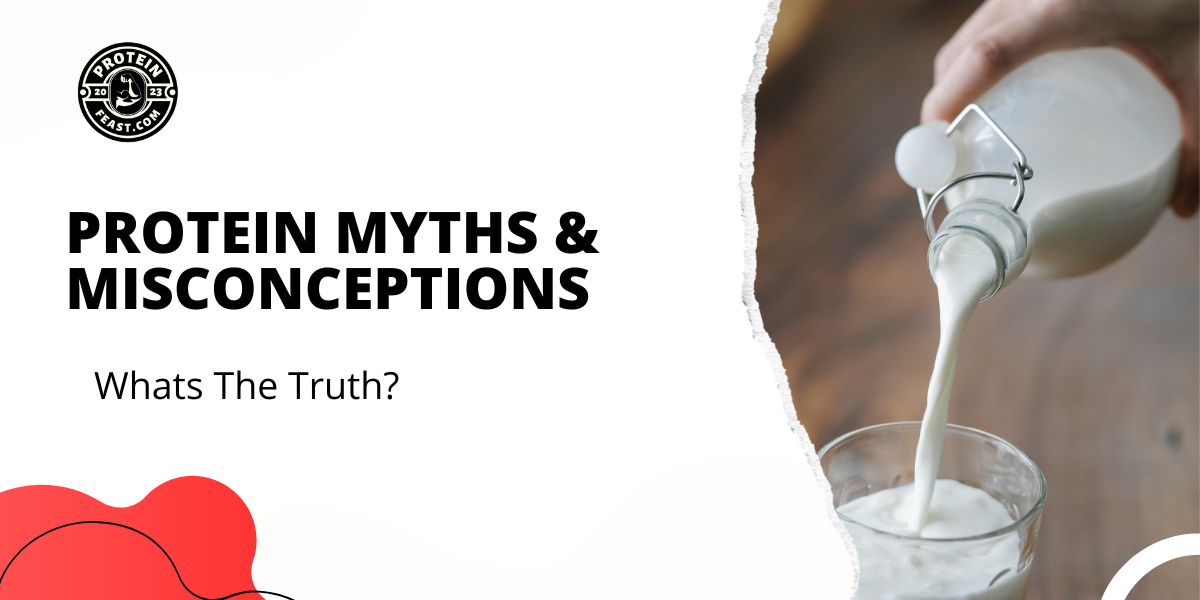
Protein is essential for a healthy diet, fueling the booming supplement market. However, widespread myths and inaccuracies contribute to confusion.
Protein Simplified
To better understand the misconceptions about protein, let’s start by defining its fundamental role in our body and health.
Protein is a vital macronutrient, along with carbohydrates and fats, that forms an essential part of our diet. Composed of more than 20 amino acids, often referred to as “building blocks,” protein serves multiple purposes.
First and foremost, protein plays a key role in the growth and repair of muscle, bone, hair, and nails. Additionally, it aids in enzyme production, facilitating digestion, and contributes to hormone regulation. (1)
Myths
1. All Protein Sources are Equally Healthy
One common mistake often made by individuals aiming to improve their nutrition is assuming that all protein sources provide the same nutritional value and benefits.
Transitioning to a healthier diet with increased protein intake requires more than simply adding peanut butter to every snack. While peanut butter is a convenient protein source commonly found in many households, it is high in fats, calories, and sodium, while offering minimal minerals. (2)
When considering your protein choices, it’s important to assess whether they provide a well-balanced nutritional profile. The same applies to protein supplements, as each product may vary, especially when comparing whey and plant-based sources. It is recommended to incorporate a diverse range of protein sources, including meats, eggs, nuts, and yogurt, to ensure a comprehensive intake of essential nutrients.
2. Protein Leads to Unwanted Weight Gain
You may have come across bodybuilders praising protein for its role in weight gain or muscle building. Does this mean protein should be avoided by those looking to lose weight?
The simple answer is no, it should not be avoided. While protein is indeed crucial for bodybuilding, it’s important to clarify that the weight gain often associated with protein consumption primarily stems from muscle growth. Many people mistakenly assume that a higher number on the scale equates to a higher percentage of body fat, but that is not necessarily the case.
In fact, protein can even be beneficial for individuals aiming to slim down or shed a few pounds. The ability of protein to promote the development of lean muscle means the body will have more metabolically active tissue, leading to a higher metabolism. In other words, having more muscle mass results in burning more calories at rest. (3)
Protein also aids in satiety, which means you’ll feel fuller for longer and are less likely to experience constant cravings that could push you beyond your daily caloric needs.
3. Protein Needs to be Consumed Immediately After Workout
One common myth that many gym-goers fall for is the belief in a specific time window for consuming protein post-workout in order to maximize the benefits of their workout. However, this notion is not entirely true.
The timing of protein consumption post-workout has been a subject of extensive debate. Research has shown that the concept of a narrow “window” can vary depending on individual factors. Protein synthesis and breakdown differ from person to person, making it challenging to draw definitive conclusions from studies on this topic. (4)
Therefore, there is no need to stress or feel rushed to consume a meal immediately after your workout. As long as you maintain a well-balanced diet and proper nutrition throughout the 24-hour period, you are likely maximizing the benefits of your gym session.
4. High Protein Intake is Impossible on a Plant-Based Diet
Many people mistakenly believe that those who follow plant-based diets struggle to meet their protein requirements, particularly when it comes to muscle building. However, this assumption is far from accurate. Plant-based diets offer numerous protein sources that can effectively contribute to one’s overall protein intake. Incorporating foods like beans, nuts, and seeds into your meals can make significant strides in increasing protein consumption.
Moreover, plant-based protein supplements have become increasingly accessible in most supermarkets, catering to the needs of those with specific dietary preferences. These supplements are derived from plant sources such as peas, soy, and hemp, providing an additional option for meeting protein needs.
5. It’s Never Too Much Protein
While protein offers numerous benefits, it is important to monitor the quantity consumed and maintain a well-balanced diet.
Excessive protein intake can have negative implications for your metabolism, bone health, and kidneys. Research has highlighted the adverse effects of high protein diets, particularly the increased risk of heart-related diseases associated with the excessive consumption of red meats. (5)
Therefore, it is crucial to strike a balance and ensure moderation in protein consumption, considering both the quality and source of protein. Incorporating a variety of protein-rich foods, including lean meats, fish, dairy products, legumes, and plant-based sources, can help maintain a healthy and well-rounded diet. By doing so, you can enjoy the benefits of protein while minimizing the potential risks associated with excessive protein intake